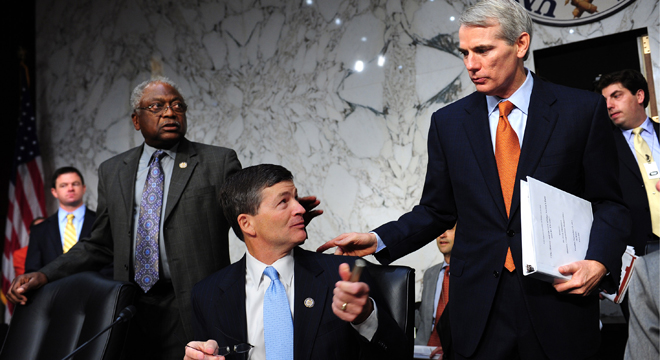Super Committee Democrats and Republicans and the leaders of both parties will work through the weekend to avoid missing their fast approaching deadline to cut $1.2 trillion from federal deficits over the next decade. Though the 12 members officially have until Wednesday to reach an agreement, the more realistic deadline is Monday evening, by which time they must have word back from CBO about the impact any plan they send to Congress will have on the budget.
Failure is very much an option. And if failure happens, Capitol Hill politics will take a severe turn heading into the 2012 election.
If November 23 comes and goes and there’s no deal, Republicans will declare war on both Democrats and each other, and the most powerful interest groups in Washington will maul both parties in an effort to make sure that Super Committee failure doesn’t translate into lost profits.
When Congressional leaders and the White House devised the Super Committee, they agreed that it should be paired with an enforcement mechanism, designed to make sure that members of both parties had a huge incentive to compromise — the consequences of failure were designed to be draconian, irresponsible, unacceptable to either party.
To bring Democrats to the table, the leaders decided that the penalty would include an across the board two percent cut to Medicare providers and other domestic programs starting in January 2013. To bring Republicans to the table, Democrats wanted the penalty to include automatic tax increases. Republicans objected strenuously so the parties settled on hundreds of billions of dollars in across the board cuts to defense and security programs, also starting in January 2013.
Now we’re on the precipice of Super Committee failure. After Wednesday, the panel will no longer have the power to submit amendment- and filibuster-proof legislation to the Congress for a guaranteed vote. That means cleaning up the mess will have to happen in the regular order, setting the stage for the biggest election year legislative food fight in decades.
Republicans are already threatening to renege on their half of the deal on the enforcement mechanism — to amend the debt limit law and swap out the defense cuts for other budget savings. Privately, they acknowledge that this will be difficult. Just zeroing out the automatic defense and security cuts would add hundreds of billions of dollars to the deficit, and quite possibly trigger another ratings agency downgrade. But taking the money out of domestic programs instead would violate another part of the debt limit deal that set discretionary spending caps for years. And Democrats will be damned before they allow Republicans to replace their half of the enforcement mechanism with even more cuts to the social safety net.
Still, Republicans will pick a big fight with Democrats to get rid of the automatic defense cuts somehow. And the politics will be brutal. Picture 30-second ads with unarmed soldiers taken captive by hostile terrorists and you’ll see what I mean.
Democratic leaders insist the penalty will stand.
“The sequestration is part of the legislation and that’s what we will follow,” Nancy Pelosi said Thursday. “I don’t like the formulation, but it is what it is and that’s what we have to honor because we have to act now…. If you refuse to take one red cent from the wealthiest people in our country and the price we have to pay is the diminished defense and diminished strength of our country…. That just isn’t right. Those people don’t think it’s right.”
An added twist is that the GOP campaign to change the penalty snuff out what’s left of the trust between the two parties. As far as Democratic leaders and the White House are concerned, Republicans agreed to a deal they had no intention of honoring. That makes it foolish for them to trust the GOP in future negotiations. It’s unclear yet whether John Boehner will side with his caucus in this fight, or passively allow them to work their will. But it’s unthinkable that he’d actively work against his own members. Boehner sidestepped my question about this at his Thursday press conference. “The sequester is ugly. It was designed to be ugly because we didn’t want anybody to go there. And I’m going to do everything I can do to ensure that we don’t go there,” he said.
Super Committee failure will also rapidly accelerate an ongoing debate within the GOP over whether their absolute opposition to new taxes is politically or substantively sustainable — particularly if they’re going to insist on relatively high levels of defense spending. Disagreements between the right flank of congressional Republicans and less conservative members are going public, as are fights with Congressional Republicans and anti-tax advocates like Grover Norquist. Complicating matters for the GOP is the fact that all of their Presidential hopefuls have inveighed against a thin dime in new tax revenue. That means any deal the GOP strikes with Democrats between now and November 2012 would threaten to leave Republicans in disarray. The fact that all the Bush tax cuts are set to expire on January 1, 2013 — just as the enforcement mechanism kicks in — adds to the pressure as well.
Aides in both parties were pessimistic Thursday that the Super Committee would come close to meeting its mark. But even if the panel gets part of the way there, it only solves part of the problem. The penalty is designed to kick in proportionately if the Super Committee falls short of $1.2 trillion, to make up the difference. A $600 billion package still means hundreds of billions of dollars of indiscriminate cuts to the defense budget. And a small package like that will likely be comprised of a series of modest, uncontroversial measures — which would make the menu for getting the rest of the way there that much more unappealing to both parties.










